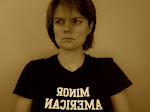Today an article on Helen Vendler online at the Chronicle of Higher Education helps me clarify what I meant when I complained about the uses to which Elizabeth Bishop is put. Like most New American Poetomanes, I chafe at Vendler's insulated tastes. And yet.
There was a time when I, too, wanted to be Gerard Manley Hopkins. If I had discovered poetry as an undergrad, be it Williams or Brown or Iowa, et cetera, I might have formed a notion of poetry that was more contemporary, that cleaved to the language of my teachers, but no, I "discovered" poetry in abandoned textbooks at stoop sales, and what there was was Hopkins, Eliot, Stevens, not to mention Frost and Roethke and maybe WCW's "The Kermess." Pretty conservative. Pretty great. But by the time I left college with a degree in philosophy, I had lost God and acquired its poor substitute skepticism, and thus it became impossible to access the sublime as I had formerly known it. The sublime was sublimated, then, in a more deeply informed Modernism which opened me up to the New Americans. Like ontogeny recapitulating phylogeny, I passed rapidly through the stages of Romanticism, death of God, Modernism, contemporaneity. I had no use for the contemporary poets Vendler championed -- from practically my infancy. If someone so steeped in the fiery language of Hopkins, Donne, Shakespeare, or Yeats could only champion the most bleached-out, angsty white upper-middle-class American poets, either she or I had to be seriously mistaken.
Let me indulge my class rage for a sec. After a few years in Boston and New York, you realize the deal -- that, while you always knew you weren't born into privilege, you had deluded yourself into thinking that you didn't want it anyway. That your desires weren't about Chanel suits, country houses, jaguars. Oh, but then you came to New York and met rich girls who had beautiful educations, the kind you dreamed of, and themselves moved quite naturally, smoothly, from Dalton to Yale to Princeton to great private school jobs teaching poetry to other smart, rich kids; or to tenured jobs -- tenured without a ripple -- in quaint, beautiful disciplines in universities while you & your own friends were hired as adjuncts, comp teachers, teaching to foreign students and single mothers trying to learn English so they could make it in American business.
(Well, Vendler came to her vocation back when girls, much less working-class Catholic girls like her, didn't often penetrate the upper echelons of academia, aka the fiefdom of white guys sinking softly into alcoholism, quoting Milton. ((Now imagine Susan Howe rewriting Who's Afraid of Virginia Woolf?)) I appreciate Vendler's triumph.)
Academia's equation of education and tradition with upper-class mores finds its apotheosis in Robert Lowell, our own Rain King, riche, mais impuissant, jeune et pourtant très vieux. Say you never "got" Lowell. Say lines like "the drained faces of Negro school-children rise like balloons" and "giant finned cars nose forward like fish" always struck you as lame, quotidian, nothing like what you got from "the only emperor is the emperor of ice cream" or "imaginary gardens with real toads in them." Nothing like what you got from Barbara Guest's
"The Art Classes above the basement cafeteria clumped about and dragged things across the floor. 'Picasso's heavy easel,' murmured Arnholt. 'With Las Meninas on it,' shouted Pedersen."
(Suddenly the easel carries the real weight of figures, a la Moore's dictum; you feel their weight in your bones.)
No, you never got this from Lowell, but somehow he loomed over a generation, then over the second half of the 20th century, in the minds of those who really, really just wanted his princeling comportment, his aristocracy -- not an aristocracy of the imagination, but the real toad in the garden!
Ah, etiolated white people! Ah, timid poetry!
Tuesday, January 25, 2005
Subscribe to:
Post Comments (Atom)


No comments:
Post a Comment